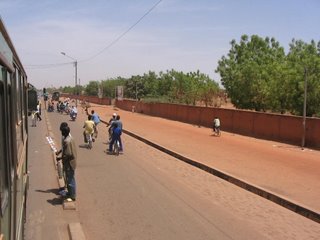First mission in the North
day visit to the villages is not enough to go in
depth about their needs. But it was certainly an eye opening experience and a reinforcement on the thought: I am so damn lucky to live and have lived the life that I have.
 A white person in the village, attracts a lot of attention. Little kids are normally scared of white people and they hide away from you. In one of the villages that we visited, they held a village meeting to discuss the project and to express their thoughts. Almost everyone in the village participated in the meeting except the village chef! So my first reaction to this was sort of like “well, if he is the head of the village, he must be the most important one here and so why isn’t he participating in this gathering?” And the response was that its the visitors who will have to go to the village chef and not the chef to them! So after the gathering, we went to give our salutation to the chef, men shake hands with the chef while women kneel on the ground and pay their respect from a distance. I followed the other women in doing so which brought a laughter to the crowd.
A white person in the village, attracts a lot of attention. Little kids are normally scared of white people and they hide away from you. In one of the villages that we visited, they held a village meeting to discuss the project and to express their thoughts. Almost everyone in the village participated in the meeting except the village chef! So my first reaction to this was sort of like “well, if he is the head of the village, he must be the most important one here and so why isn’t he participating in this gathering?” And the response was that its the visitors who will have to go to the village chef and not the chef to them! So after the gathering, we went to give our salutation to the chef, men shake hands with the chef while women kneel on the ground and pay their respect from a distance. I followed the other women in doing so which brought a laughter to the crowd.It was also during this mission that I had a thought provoking and yet frustrating experience with a co-worker. The conversation started as we were driving from village to village. I was in a 4X4 (big cars are the way to go in rural areas) with four co-workers (all men) and the base of the conversation was the male-female roles in Burkina verses Canada. I have to admit being in the back seat stuck between two men while hearing them bluntly claim that God created men first and women were created later
 to serve men’s needs was not the most comfortable position. As I further discovered, this fellow co-worker of mine believed with all certainty that women should not have the same rights as men, that he would not allow his wife to occupy herself with activities other than house work and raising kids, that men need to put their women in the right direction……. By this point; I was about to explode with anger but I did a good job of controlling myself. I tried to explain to him that not everywhere in the world this is the case, that in Canada I would have the same rights as my husband would and that I certainly believe his wife is capable of making her own decisions to determine what is best for her…..
to serve men’s needs was not the most comfortable position. As I further discovered, this fellow co-worker of mine believed with all certainty that women should not have the same rights as men, that he would not allow his wife to occupy herself with activities other than house work and raising kids, that men need to put their women in the right direction……. By this point; I was about to explode with anger but I did a good job of controlling myself. I tried to explain to him that not everywhere in the world this is the case, that in Canada I would have the same rights as my husband would and that I certainly believe his wife is capable of making her own decisions to determine what is best for her…..The challenging part was the realization that as much as I could not agree with what he was saying, nor could he understand my side. I realized how different we are, how ingrained are the roots to these differences and how challenging it is to try to change one another.





